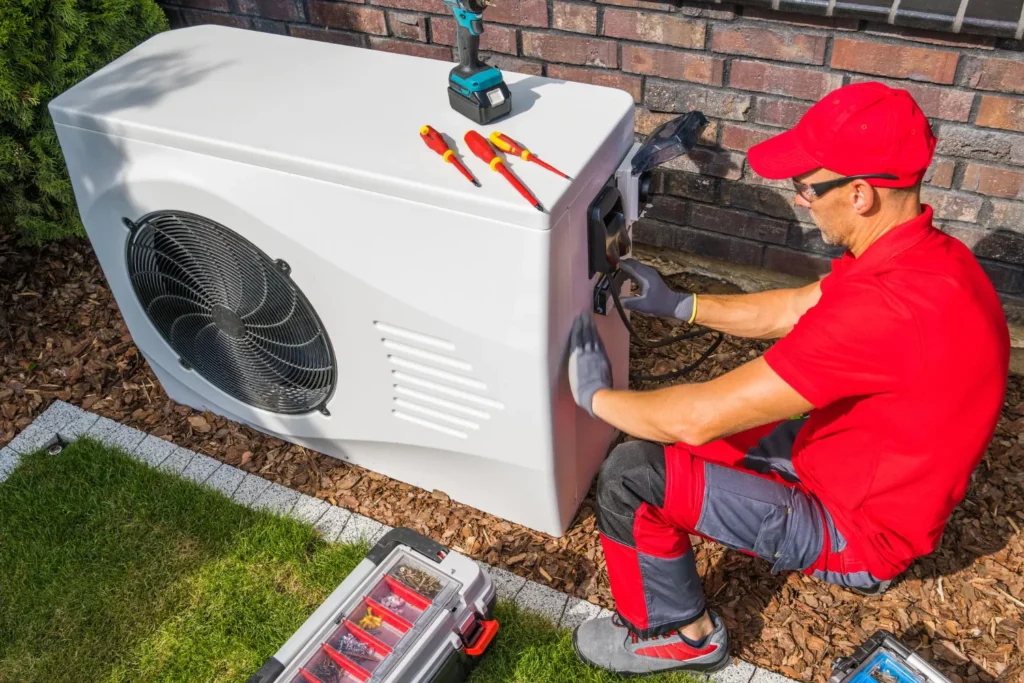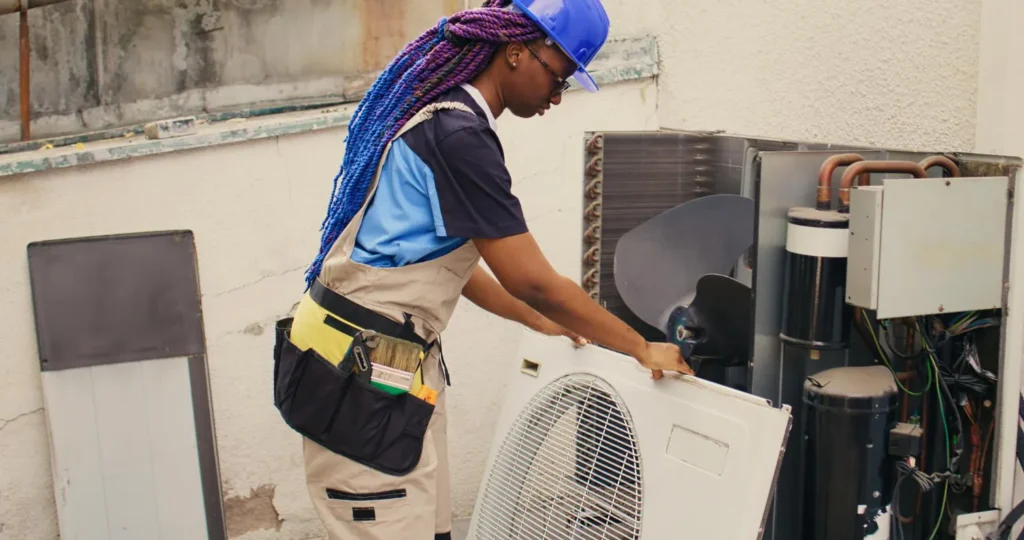When the sweltering heat of Richmond hits, the last thing anyone wants is their air conditioning to fail due to an AC refrigerant leak. At 75 Degree AC, we understand the urgency and provide expert solutions to keep your cooling system in peak condition. This guide will delve into the causes, signs, and critical actions required for handling refrigerant leaks, ensuring your air conditioner remains effective and safe throughout the hottest days.
What Should I Do If My AC Refrigerant Is Leaking? [Freon Leak]
Discovering a refrigerant leak in your air conditioning system can be alarming. Immediate action is crucial to prevent further damage and potential health risks. First, ensure the area gets well-ventilated to mitigate any immediate hazards from the leaking Freon, which can be dangerous to your health and the environment. Next, shut off your air conditioner to prevent further loss of refrigerant and energy inefficiency. It’s essential to call professionals like 75 Degree AC at (346) 857-8722 for an inspection and precise repair.
What Causes Refrigerant Leaks in Air Conditioners

The Connections In The Cooling Unit Have Weakened
Over time, the connections within your air conditioning system can weaken due to various factors. Vibration from the unit’s operation and temperature fluctuations can cause fittings, joints, and connections to loosen or degrade. This wear is gradual but can eventually lead to noticeable leaks if the connections are not regularly checked and tightened during routine maintenance.
The HVAC System Was Not Installed Properly
Improper installation of an HVAC system is a significant contributor to early failures, including refrigerant leaks. Installation errors might include:
- Using incorrect or mismatched components.
- Failure to secure connections tightly.
- Not following manufacturer guidelines for installation.
Such mistakes can lead to immediate or eventual refrigerant leaks, significantly impacting the system’s efficiency and lifespan.
The Air Conditioner Is Defective
Sometimes, the cause of a ac refrigerant leak is beyond the control of the installer or the homeowner. Defects from the manufacturing process, such as flawed compressor units, faulty valves, or inferior piping, can lead to leaks. These defects might not be evident immediately and can manifest as leaks after the system has been operating for some time.
Time and Use Takes A Toll On The Air Conditioning System
Regular use of an air conditioning system naturally leads to wear and tear. Components like compressors, coils, and refrigerant lines can develop leaks over time. Environmental factors such as exposure to extreme weather, corrosive environments, or accidental damage during other home maintenance activities can exacerbate this deterioration. Regular inspections and maintenance by a professional service like 75 Degree AC can help identify and mitigate these risks before they lead to significant issues like ac refrigerant leak.
Understanding these common causes helps you proactively maintain your air conditioning system, ensuring it remains efficient and effective throughout its service life. Regular check-ups by a certified professional are crucial in detecting early signs of potential problems, allowing for repairs before a minor issue becomes a major headache. At 75 Degree AC, our experts are ready to assist you with comprehensive maintenance plans tailored to your specific needs and the challenges posed by the Richmond climate.
Signs of Refrigerant Leak in AC Unit
Detecting a ac refrigerant leak early can prevent more severe air conditioner issues and expensive repairs. Here are some signs that your AC unit has a refrigerant leak, which we at 75 Degree AC are equipped to handle swiftly and effectively.
Longer Cooling Time
One of the first signs of a refrigerant leak in an air conditioning system is an increase in the time it takes to cool your home. If the AC is running longer than usual to achieve the same level of comfort, or if certain rooms are not cooling down as they should, it could be due to a drop in refrigerant levels. Refrigerant is essential for absorbing heat from the air inside your home; less refrigerant means less efficient cooling.
Higher Utility Bills
An unexpected increase in your energy bills can often be traced back to a refrigerant leak in your AC unit. When there is a leak, the air conditioner must work harder and run longer to produce the same amount of cooling, consuming more energy. This inefficiency is reflected in higher utility costs. Monitoring your energy bills for unexplained increases can help catch a refrigerant leak early before it leads to more significant system damage.
Increased Humidity Indoors
The air conditioner doesn’t just cool your home; it also plays a crucial role in reducing indoor humidity. A well-functioning AC unit removes moisture from the air as it cools it. However, a system with a ac refrigerant leak may fail to dehumidify effectively. This can leave your indoor environment feeling muggier than usual, which is uncomfortable and can encourage mold and mildew growth.
Hissing Sound at Outdoor Unit
A hissing sound emanating from the outdoor unit of your air conditioner is a classic indicator of a ac refrigerant leak. This sound can occur when the pressurized refrigerant escapes through cracks or holes in the cooling system’s components. It’s crucial to note that these sounds may not be continuous and could vary in intensity depending on the size and location of the leak. If you hear hissing sounds coming from your outdoor unit, it’s advisable to contact 75 Degree AC immediately. Our trained technicians can quickly identify the source of the leak and repair it to prevent further damage and loss of refrigerant.
Evaporator Coils Are Frozen
Another telltale sign of a refrigerant leak is frozen evaporator coils. Under normal conditions, the refrigerant absorbs heat from the indoor air, keeping the coils above freezing. However, if there is a ac refrigerant leak, there won’t be enough refrigerant flowing through the coils to absorb sufficient heat, leading to a drop in temperature and causing condensation on the coils to freeze. This ice buildup can further impair the air conditioner’s ability to cool your home. It may lead to more significant issues, such as damage to the compressor, if not addressed promptly. Suppose you notice ice on your evaporator coils or any unusual frosting in your AC unit. In that case, it’s essential to shut off the system and call a professional from 75 Degree AC to investigate and resolve the issue.
These signs, including unusual noises and visual indicators like ice formation, are critical for homeowners. Identifying these symptoms early with the help of professionals like those at 75 Degree AC can ensure that your air conditioning system is repaired efficiently, restoring comfort and safety to your home environment.
Also Read >> Understanding AC Short Cycling – Causes and Quick Fixes
Is Leaking Freon Potentially Dangerous?
Leaking Freon is a serious concern not only for the efficiency of your air conditioning system but also for health and environmental reasons. Freon, a type of refrigerant, is considered hazardous when exposed to the environment. Inhalation of Freon can lead to several health issues, such as headaches, dizziness, and, in severe cases, respiratory problems or cardiac arrhythmia. Moreover, Freon leaks contribute to the depletion of the ozone layer and have a global warming potential, which makes them harmful to the environment. Given these risks, it is crucial to address Freon leaks promptly. At 75 Degree AC, we emphasize the importance of professional intervention to safely manage and repair Freon leaks, ensuring the health and safety of our clients and the planet.
What Happens When There Is A Leak In The Cooling System
A refrigerant leak in your air conditioning system affects more than just your home’s temperature; it impacts the overall functionality and lifespan of the unit. When the system leaks refrigerant, it begins to operate inefficiently, struggling to reach and maintain the desired temperature. This inefficiency leads to increased energy consumption and higher utility bills, as the system must work harder and longer to cool your home. Additionally, a prolonged refrigerant leak can cause the compressor, the heart of the AC system, to overheat and fail due to the increased strain and inadequate refrigerant levels. Such damage leads to costly repairs and could necessitate the complete replacement of the unit if not handled in time. Regular maintenance and early detection of leaks can significantly extend the life of your air conditioning system and ensure its efficient operation.
Do Not Try To Repair Or Replace Your Air Conditioner Yourself

Air conditioner repair and refrigerant handling require professional skills, specialized tools, and an understanding of complex HVAC systems. Additionally, regulations such as those stipulated by the Environmental Protection Agency (EPA) restrict the handling of refrigerants to certified professionals to ensure safety and compliance with environmental laws. Attempting to repair or replace your air conditioner yourself can lead to further damage to the system, void warranties, and even pose significant personal injury risks or legal ramifications. It is essential to rely on trained and certified professionals like those at 75 Degree AC to safely and effectively manage any issues with your air conditioning system. By trusting the experts, you ensure your AC unit is fixed correctly and optimized for performance and longevity.
Can I Top Off My Freon with R410a?
When maintaining or repairing your air conditioning system, particularly regarding refrigerant issues, it’s crucial to understand the compatibility and legal implications of the refrigerants used. Freon typically refers to R-22, a chlorofluorocarbon (CFC) that has been phased out due to its harmful effects on the ozone layer. R410a, on the other hand, is a newer, more environmentally friendly hydrofluorocarbon (HFC) that does not deplete the ozone layer.
Mixing R410a with R-22 (Freon) is not recommended and is, in fact, illegal in many jurisdictions. The two refrigerants operate at different pressures and have different chemical properties, leading to system inefficiency, increased wear and tear on the air conditioning components, and potential damage. Additionally, using R410a in a system designed for R-22 could void the manufacturer’s warranty and violate federal regulations.
Suppose your system currently uses R-22 and needs a top-off. In that case, it’s a sign of underlying issues, typically leaks, that need to be addressed by a professional. At 75 Degrees AC, we can assess your system and provide solutions that involve repairing the leak and refilling the correct refrigerant or upgrading your system to one that uses R410a if a replacement is deemed necessary.
What Should I Do If I Suspect a Freon Leak?
If you suspect that your air conditioning system is leaking Freon, taking immediate action is essential to minimize potential hazards and prevent further damage to the system. Here are the steps you should follow:
- Turn Off Your AC Unit: As soon as you suspect a leak, turn off your air conditioner to prevent further loss of refrigerant and to avoid damage to the compressor.
- Ventilate the Area: If the indoor unit is leaking, ensure that the area is well-ventilated to reduce the concentration of Freon in the air, which can be harmful if inhaled.
- Do Not Attempt DIY Repairs: Given the complexities of handling refrigerants and the potential for personal harm or environmental damage, avoid trying to fix the leak yourself.
- Contact a Professional: Call 75 Degree AC at (346) 857-8722. Our certified technicians are equipped to handle refrigerant leaks safely and effectively, ensuring that your system is repaired according to industry standards and environmental regulations.
- Schedule a Leak Test: Our professionals will perform a detailed leak test to identify the exact source of the leak. This test involves using specialized equipment to detect minor leaks, ensuring everything is noticed.
- Discuss Repair or Replacement Options: Depending on the age of your AC unit and the extent of the leak, it might be more cost-effective to repair the leak and recharge the system or, in some cases, consider upgrading to a newer, more efficient model.
These steps will help ensure that your air conditioning system continues to operate safely and efficiently, keeping your home comfortable and your air quality high. At 75 Degree AC, we are committed to providing reliable, high-quality service to address all your HVAC needs.
FAQs
What causes refrigerant leaks in air conditioners?
Refrigerant leaks in air conditioners can occur due to several factors, including weakened connections in the cooling unit, improper installation, defects in the air conditioner itself, or natural wear and tear over time due to regular use and environmental conditions.
Can an AC refrigerant leak be fixed?
Yes, an AC refrigerant leak can be fixed. The process typically involves
- identifying the leak source,
- repairing or replacing the faulty components, and
- adequately recharging the system with refrigerant.
It’s essential to address these repairs with the help of certified professionals like those at 75 Degree AC to ensure the system is fixed correctly and safely.
How much does fixing a refrigerant leak in an air conditioner cost?
Fixing a ac refrigerant leak can vary depending on its location, severity, and cost of replacement parts. Minor leaks are generally less expensive, whereas more significant issues require more extensive repairs or part replacements, potentially making them more costly.
What happens if AC refrigerant leaks?
If AC refrigerant leaks, your system will operate inefficiently, leading to increased energy usage and higher utility bills. Over time, a leak can also cause the system to overheat and potentially lead to compressor failure, one of the most significant and expensive repairs in an air conditioning system.
How do I know if my AC has a refrigerant leak?
Signs that your AC might have a refrigerant leak include longer cooling times, higher than usual utility bills, increased humidity indoors, hissing sounds from the unit, and ice formation on the evaporator coils. You should contact a professional to inspect your system if you observe any of these signs.
If the air conditioning leaks freon, does it leak constantly or only when turned on?
A freon leak in an air conditioning system can occur regardless of whether the unit is turned on or off. However, it may be more noticeable when the system operates due to the increased pressure that can exacerbate the leak.
Does freon leak when my AC unit is turned off?
Yes, freon can still leak when the AC unit is turned off, especially if significant breaches or failures in the system components contain the refrigerant.
What does a coolant leak look like?
A coolant or refrigerant leak is usually invisible since refrigerant evaporates quickly into the air. However, you might see evidence of an oil residue around the leak site or notice ice formation on the air conditioner’s evaporator coils and piping, indicating a possible leak.
How long does it take for freon to leak out of the system?
The rate at which freon leaks out of an air conditioning system depends on its size. Small leaks might take months to significantly affect the system’s operation, while more significant leaks can have an immediate impact.
What does freon smell like?
Freon is generally odorless, which makes detecting leaks by smell alone tricky. However, in some cases, you might detect a slightly sweet or chloroform-like smell due to chemical additives in the refrigerant.
Is an AC refrigerant leak toxic?
Refrigerant leaks can be toxic, especially in enclosed areas where the leaked gas can accumulate. Inhaling refrigerant can lead to health issues such as nausea, headaches, and, in severe cases, asphyxiation.
Is a refrigerant leak expensive to fix?
The cost of fixing a refrigerant leak can vary widely. Minor leaks might be relatively inexpensive, while major leaks requiring significant part replacements or system alterations can be more costly. Early detection and repair are crucial to minimizing these costs.
